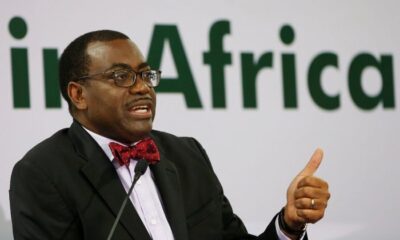Government
Bad Times Are Over, the Future is Bright, Says Osinbajo
Published
8 years agoon

- Bad Times Are Over, the Future is Bright, Says Osinbajo
Acting President Yemi Osinbajo on Monday urged Nigerians not to despair over the prevailing economic hardships, assuring them that the worst days were over and the future was brighter.
In a nationwide broadcast to commemorate the mid-term anniversary of President Muhammadu Buhari’s administration, he said the most difficult phase of economic crisis had been overcome and encouraged Nigerians to look forward to a brighter and more promising tenure.
Osinbajo, who said there was increasing intensity of the light coming at the end of the tunnel, also sought the co-operation and support of Nigerians in the administration’s bid to achieve its goals and objectives.
While assuring Nigerians that the 2017 budget would soon be signed into law to pave the way for the execution of the goals and objectives of the administration, Osinbajo recalled the comment once made by Buhari that old Nigeria was gradually giving way to a new nation.
“We also know that this journey will of necessity take time. But we will not succumb to the temptation to take short-cuts that ultimately complicate the journey. We did not find ourselves in crises overnight, and we simply do not expect overnight solutions to our challenges.
“The most important thing is that we are on the right path, and we will not deviate from it, even in the face of strong temptation to choose temporary gains over long-term benefits. As the President has summed it up: ‘The old Nigeria is slowly but surely disappearing, and a new era is rising.’ And so we commemorate this second anniversary of our administration with confidence and optimism.
“I firmly believe that we have put the most difficult phase behind us; and we are witnesses to the ever-increasing intensity of the light at the end of the tunnel. We ask for your continued cooperation and support, to enable us realise all our best intentions and ambitions for Nigeria. On our part we will continue to carry you along on this journey, speak to you, explain the challenges, and share our vision,” he said.
The acting president who said the administration had been focused on the war against corruption, lamented the alleged looting of public funds by unscrupulous Nigerians in the previous administrations.
However, he admitted that the anti-corruption process had been slow because corruption had been fighting back, aided by the slow pace of the nation’s justice administration.
Disclosing that the implementation of the Treasury Single Account (TSA) was one of the deterrents meant to curb corruption, Osinbajo added that its coverage had been expanded to include more efficient accounting and budgeting systems. “We have also launched an extremely successful whistle blower policy,” he added.
He listed other measures designed to check corruption by the government to include the Efficiency Unit in the Federal Ministry of Finance, which he said had been used to plug leakages running into billions of naira, adding: “We have ended expensive and much-abused fertiliser and petrol subsidy regimes.”
He also said in line with the administration’s promise to invest in the future, the federal government had not only pumped $500 million into the Sovereign Wealth Fund (SWF), it had also raised the Excess Crude Account (ECA) by $87 million.
Nevertheless, he said, the greatest challenge confronting the administration was economic crisis, pointing out that the government was concerned about the pains Nigerians have gone through, observing that some had lost jobs to the economic crisis, others have had to cope with high cost of food prices while some, notably in the states, could not even obtain regular salaries, a situation, he said, had resulted in medium and short-term interventions meant to rebuild the economy as well as federal government’s bailout funds to the states along with social interventions programme.
Listing other achievements of the government to include the employment of 200,000 unemployed graduates through N-Power online portal under the SIP platform, he said micro credit had also been given to a million artisans, traders and market women and huge investment made in rail network, adding that a number of the government initiatives were targeted at young persons.
He also disclosed that in pursuit of power sector recovery plan, N701 billion payment assurance scheme was launched in March to resolve hiccups militating against the financing of operations of gas suppliers and generation companies.
Emphasising that the recently passed 2017 budget would boost government’s economic recovery plan when signed into law, Osinbajo cited what he described as the successful Eurobond recently launched, describing the N1.2 trillion spent on capital projects in 2016 fiscal year as a milestone in the history of the country.
He said: “We opened the year with an overwhelmingly successful Eurobond Offer – evidence of continuing investor interest in Nigeria. We have also launched the Economic Recovery and Growth Plan (ERGP) 2017-2020, to build on the gains of last year’s Strategic Implementation Plan. And the implementation of our 2017 Budget, which will soon be signed into law, will bring added impetus to our ongoing economic recovery.
“In the 2016 Budget we spent N1.2 trillion on infrastructure projects, another milestone in the history of this country. Our 2017 Budget will double that investment.”
Hinting on government’s plan to invest in parks, special economic zones, social housing programme, industrial parks and a desire to make Nigeria a manufacturing hub, Osinbajo said the government’s housing programme would provide less expensive mortgages for low-income individuals and families across the country.
He also emphasised government’s commitment to invest in food security, energy, agriculture, industrialisation, transport infrastructure, home made goods and as well as stop importation of foreign items for local consumption including fuel.
According to Osinbajo, “These plans offer yet more evidence that we are ramping up the pace of work; the work of fulfilling all that we promised. In the next two years we will build on the successes of the last two. We have demonstrated a willingness to learn from our mistakes and to improve on our successes.
“The critical points that we must address fully in the next two years are: agriculture and food security, Energy, (power and petroleum) industrialisation and transport infrastructure. Every step of the way we will be working with the private sector, giving them the necessary incentives and creating an environment to invest and do business.
“Our vision is for a country that grows what it eats and produces what it consumes. It is for a country that no longer has to import petroleum products, and develop a lucrative petrochemical industry. Very importantly it is for a country whose fortunes are no longer tied to the price of a barrel of crude, but instead to the boundless talent and energy of its people, young and old, male and female as they invest in diverse areas of the economy.”
While recalling how Boko Haram insurgency had been degraded, the acting president identified herdsmen clashes with farmers in many parts of the country, which he said had culminated in loss of several lives and properties, as the recent threats to security in Nigeria, assuring Nigerians that the menace would be accordingly dealt with.
“We are working with state governments, and tasking our security agencies with designing effective strategies and interventions that will bring this menace to an end. We are determined to ensure that anyone who uses violence, or carries arms without legal authority is apprehended and sanctioned,” he stated.
In another development, Osinbajo, while speaking in the Presidential Villa, at an occasion organised to showcase government activities on the Social Investment Programme (SIP) in commemoration of Democracy Day, said Buhari, during the presidential campaign of 2015, had observed that poverty was endemic in various parts of the country and insisted that they must do something about it if they won.
He said it was that expression, which led to the invention of SIP, noting that economic development could only be achieved in a territory where people live above poverty level, adding that SIP was invented to fight poverty and unemployment.
According to him, N-Power is the largest post-tertiary job creation platform in Africa with recruitment done in a transparent form without any need for connection before qualified graduates could be recruited.
He also said part of SIP was N100 billion social housing scheme which he said would be the largest housing project in Nigerian history. The scheme, he added, would provide developers with the opportunity to obtain 80 per cent of the cost of developing an estate as loan while any Nigerian who can afford as little as N30,000 per month would be able to buy a house of his own.
Disclosing that the N-Power portal would be re-opened on June 13, this year, the acting president described SIP as one of the largest, diverse and complicated programmes in scope. He said it was not a favour to any beneficiary but rather the right of anyone found to be qualified.
He also said even though the N30,000 monthly salary being paid to every beneficiary of N-Power looked small, it was good for anyone who had been jobless over the years to take off from that point.
Also speaking, the Special Adviser to the President on SIP, Mrs. Maryam Uwais, described the programme as a bond between the government and the people as contained in the manifesto of the All Progressives Congress (APC).
According to her, the programme provides a level playing field for the poor, unemployed and vulnerable Nigerians through a transparent process, disclosing that N80 billion had so far been released for the programme out of which she said N41 billion had been spent.
She also said 70,000 identified poor households from nine states with valid bank verification numbers were currently being paid N5,000 monthly stipend as social assistance while 350,000 others had also been identified in 12 states.
Uwais added that N400 billion had been approved in the 2017 budget for the programme with additional N100 billion for the housing project.
In his own speech, the Senate Minority Leader, Senator Godswill Akpabio, who commended the government for the programme, advised the administration to capture many more vulnerable Nigerians in the scheme.
Akpabio also advised the federal government to expand the scope of SIP to orphanages and other places where there were downtrodden Nigerians and equally ensure that the programme was given better publicity so that Nigerians in the rural areas could also benefit from it.
However, the Senate President, Dr. Bukola Saraki, and Speaker of the House of Representatives, Hon. Yakubu Dogara, who were expected to give goodwill messages at the event were conspicuously absent. They were not also represented.
The event, which witnessed testimonies of beneficiaries of the scheme, was graced by ministers, expatriates and party officials including the National Chairman of the APC, Chief John Odigie-Oyegun.
Is the CEO and Founder of Investors King Limited. He is a seasoned foreign exchange research analyst and a published author on Yahoo Finance, Business Insider, Nasdaq, Entrepreneur.com, Investorplace, and other prominent platforms. With over two decades of experience in global financial markets, Olukoya is well-recognized in the industry.

You may like
-
Nigeria Joins BRICS as Partner Country, Strengthening Global South Cooperation
-
70 Million Poorest of The Poor Nigerians To Get N75,000 From FG
-
Nigeria Surpasses OPEC Quota with 1.51 Million bpd, Targets 2.06 Million in 2025
-
Global Investors Commit $7.6 Billion to Nigeria’s Development at AIF 2024
-
Nigeria-China Trade Strengthened as Grimaldi Introduces Direct Shipping Line
-
Nigeria’s GDP Records 3.46% Growth in Q3 Spurred by Non-Oil Sector













